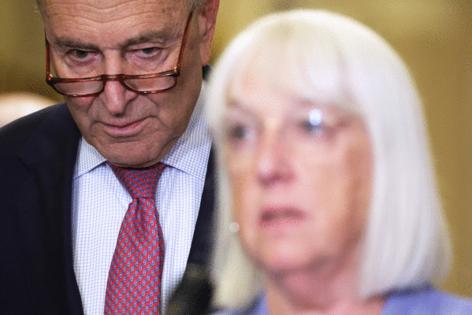On Dobbs anniversary, Democrats note GOP bill's abortion entanglements
Published in Political News
WASHINGTON — Three years after the Supreme Court overturned the right to abortion in the United States, Senate Democrats are calling for the removal of further abortion restrictions in the Republican reconciliation bill.
Speaking at a news conference Tuesday, the third anniversary of the landmark decision in Dobbs v. Jackson Women’s Health Organization, Senate Minority Leader Charles E. Schumer pointed to provisions in the bill that would prohibit health care marketplace insurance from covering abortion care and would ban Medicaid reimbursements to Planned Parenthood.
“Let’s call this what it is,” Schumer, D-N.Y., said. “It’s a Republican backdoor abortion ban.”
As the Senate looks to complete its version and vote this week, those provisions are under scrutiny for potentially violating the Byrd rule, which restricts reconciliation language from including provisions that aren’t germane to the budget. The Senate parliamentarian, appointed by leadership to enforce the chamber’s rules and procedures, has issued rulings for the past several days on environmental and other policies that aren’t germane and is expected to do the same for health-related provisions.
Sen. Patty Murray, D-Wash., pointed the finger back at Republicans for doubling down on policies that restrict abortion access further. She highlighted the Trump administration’s decision to revoke Biden-era guidance directing health care providers to provide abortion care in emergency circumstances, regardless of state abortion restrictions.
“Three years in, it’s clear that the heartbreak and damage being caused by Republicans’ war on abortion is only growing, but so is the public opposition,” she said. “The outcry is getting louder and louder as more and more people see the full horror of abortion bans in ways they cannot ignore, and will never forget.”
The pushback on the bill’s provisions comes just as a report showed that abortion restrictions across the country have had negative economic implications for women in the three years since Dobbs. The Government Accountability Office studied the potential economic and household effects of state-level abortion restrictions and the efforts of federal health agencies to assess those effects.
The GAO report compiled 55 studies and interviews with academic researchers and officials with subject matter expertise, as well as information from the Centers for Disease Control and Prevention and the Social Security Administration. The studies found that abortion restrictions impacted people’s decisions on where to move and affected birth and maternal mortality rates.
The report noted the limited information available on how abortion restrictions are impacting states. The Centers for Disease Control and Prevention collected some data through 2022, but reporting was voluntary and not all states provided the agency with data.
Abortions, however, unexpectedly increased after the Dobbs decision, researchers found. They attributed the increase to relaxed in-person requirements for accessing abortion medication and an increase in funding from abortion rights organizations for travel to locations without restrictions.
Still, for people seeking an abortion in states with restrictions, personal finances were worse for those who were denied abortion care, especially in the period immediately after their abortion denial. People who were denied abortion care were more likely to receive government assistance programs like Temporary Assistance for Needy Families, the Supplemental Nutrition Assistance Program and Special Supplemental Nutrition Program for Women, Infants, and Children.
©2025 CQ-Roll Call, Inc., All Rights Reserved. Visit cqrollcall.com. Distributed by Tribune Content Agency, LLC.

























































Comments